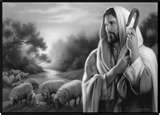Familiarity with scriptures we quote, for example the Lord’s Prayer, can often prevent us from allowing its verses to penetrate its light into our soul in a new way. When we read these passages our brain can switch to automatic, I know this; therefore, we’re reading but not really reading to capture its full significance. I’ve thought about this in regards to Psalms 23—The Lord is my Shepherd. Walk with me through this Psalms and see what new perspectives we can gain. This is part one of a three part reflection on Psalms 23. I hope you are inspired. Now lets begin to discover more of this impassioned Psalms.

“The LORD is my shepherd, I shall lack nothing”
When the word LORD is capitalized, it’s translated Jehovah. Jehovah is a proper noun, and according to the Blue Letter Bible, Jehovah is a reference to deity and means “the existing One.” As King David prayed to God, he was proclaiming God as the LORD Almighty, the Great I AM, the One True God, the All-Sufficient One.
I appreciate the fact that King David called God his LORD (Jehovah) and Shepherd in the same sentence. Perhaps he prayed this prayer because he knew the loving care of a shepherd, as he too was a shepherd before he became a King.
To recap the duties of a shepherd:
1. They oversee the care of their sheep
2. They lead their sheep to pastures
3. They guide them to water
4. They count them with their staff before they put them to bed
5. They will diligently search for the one strayed sheep
6. They protect them from prowling predators through the night
God is not only Jehovah—the All-Sufficient-Existing One—he’s our shepherd. He sets aside his Kingship to perform the responsibilities of a lowly shepherd. What I enjoy most, is, God as our shepherd cares enough to notice if one of his sheep is missing from his fold. As well he protects his sheep through the night from prowling predators who desire to devour our soul ( John 10, Psalms 91).
Therefore because God is LORD and Shepherd, we can say with King David, “I shall lack nothing.”
The King James Version says, “I shall not want.” What I think he is really saying is he shall not be in want. I believe that he knew his humanity was finite compared to the greatness of God. Therefore, he says because you are my LORD Jehovah and my shepherd, I have need of nothing because you are my provision, you are all sufficient—I need nothing else but you.
When I think of my humble lot, a queen in my own mind, I want, want, and want! I want to win the lotto (not that I play much!); I want every one to be happy; yet, I know I can’t make it happen. I want peace, perfection, and success. This of course equals discontentment. I must come to terms with my wants of: selfish ambition, self-gratification, earthly wealth (though it would be nice), fan-fare, and recognition for the good I do.
My spirit desires to love the LORD my God with all that is within me—heart, soul, and strength. To love others and think of them better then myself. This is my heart’s want and is my daily discipline.
“He makes me to lie down in green pastures, He leads me by still waters.”
“He makes me . . .” caught my attention. If you have an ounce of stubbornness in your heart, which I’m certain you do because I have at least two ounces—no one makes me do anything I don’t want to! But King David says that the LORD, the All-Sufficient One, makes him to lie down in green pastures. What does this mean? I submit it’s not so much for nourishment but God is making provision for his sheep to rest, be refreshed, and restored. For the LORD to “make me to lie down in green pastures,” means to me, that God knows what I need because he is my shepherd. Therefore, I find rest in him, my soul is quieted, and I have peace; I do not fear what tomorrow brings (Although worry finds me often!).
He leads me by still waters, not raging, or slapping, or rolling waters but “still waters.” Like a lake in the morning, which glistens with the rising sun. The waters are so still they appear like glass. This is what I picture when I reflect on “still waters.” When I consider the still-quiet waters, I sense renewal and strength in times of trouble. He is the calm in my storms. The disciples—when out to sea—were confronted with a raging storm. They cried out to Jesus, who was sleeping. When awakened, Jesus said to his disciples, “You of little faith, why are you so afraid?” Then he got up and rebuked the winds and the waves, and it was completely calm,” (Matthew 8:26). The still waters, the LORD leads us to, are completely serene. Our soul can find tranquility in his presences while our storms rage around us.
“ . . . He restores my soul.”
When we lay by the still waters, we not only find the calmness we need from our storm, but we also receive restoration. And who is not in need of restoration from living out our lives here on earth? To restore is to bring something back to its original condition. Hum. What was our original condition? I submit it was what we were “to be” before sin entered the world. Of course, we, in our own power cannot “become sinless” or “restore ourselves” that requires someone much greater then we—like our Creator. This restoring comes through the righteousness of Christ, God’s Son. He is the one who restores our spirit. “Therefore, if anyone is in Christ, he is a new creation; the old has gone, the new has come,” (2 Corinthians 5:17).
Restoration; however, will require healing of wounds—and that might hurt a bit or a lot! I cannot find wholeness unless I allow the LORD to restore, which is broken in me through life’s trials. Anyone who refurbishes cars or furniture will know it can be a long costly project. But one that is worth it in the end. When we allow Jehovah, our shepherd to lead us to green pastures, by the still waters, and relinquish our selfish want—our hope is restored, love is rekindled, and faith is increased.
What are your thoughts?


